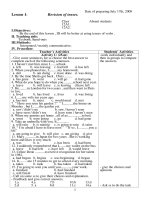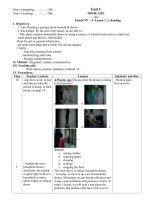Enghlish 11 UNIT 1 READING
Bạn đang xem bản rút gọn của tài liệu. Xem và tải ngay bản đầy đủ của tài liệu tại đây (668.25 KB, 14 trang )
Welcome to our
class
Watch a video and answer the question
Vocabulary
Conflict (n,v) /kən'flikt/
Cuộc xung đột, mâu thuẫn
Brand name /ˈbrænd neɪm/
Hàng hiệu, thương hiệu
Afford (v) /ə'fɔ:d/
Có khả năng chi trả
Impose (v) /im'pəʊz/
Áp đặt
Independent (a) /,indi'pendənt/
Độc lập, không phụ thuộc
Treat (v) /tri:t/
Đối xử
Norm (n) /nɔ:m/
Break rules and norms
/breik ru:l ænd nɔ:m/
Sự chuẩn mực
Phá vỡ quy tắc và chuẩn mực
1. As you see in the video, where do the conflicts
from?
2. Do you have the same conflicts in your family as
the people in the video?
Unit 1: The generation
Lessongap
3: READING
WHERE DO CONFLICTS COME FROM?
Task 1. You are going to read a text about the conflicts
between parents and their teenage children. Which of the
following do you think you may find in the text?
a. parents and children having different tastes in music.
b. parents’ strong opinions about everything related to their children.
c. children’s objection to the way their parents treat them like small kids.
d. parents’ objection to their children's clothes.
e. parents’ expectations of their children's better use of free time.
f.
parents’ strong views about their children's education and future jobs.
g. parents and children having different beliefs.
Task 2. Read the text quickly and check your predictions in
task 1.
Throughout history, there have always been conflicts between parents and their teenage
children. Here are some of the main reasons and explanations.
No matter how old their teenage children are, most parents still treat them like small kids.
As they try to help their children to discover the surrounding world, parents strongly
believe they know what is best for their children. However, as children grow up, they want
to be more independent, create their own opinions, and make their own decisions. They
don't feel comfortable when their parents still keep treating them like little kids.
One common area of conflict is the clothes children want to wear. Parents may think that
these clothes break rules and norms of society, or distract them from schoolwork. What is
more, some teens want expensive brand name clothes, which can lead to a financial burden
on their parents because many cannot afford the high prices.
Another source of conflict is the way children spend their free time. Parents may think that
their children should spend their time in a more useful way rather than playing computer
games or chatting online. But children do not always see things the way their parents do.
Conflicts also arise from different interests between parents and their children. Some
parents may try to impose their choices of university or career on their children regardless
of their children's preferences. Actually, the list of conflicts seems to be endless. Open
communication can really help to create mutual trust and understanding between parents
and their teenage children.
a.
Answer
key
parents and children having different tastes in music.
b. parents’ strong opinions about everything related to their
V
children.
V
c. children’s objection to the way their parents treat them like
V
small kids.
V
d. parents’ objection to their children's clothes.
V
e. parents’ expectations of their children's
better use of free
time.
Task 3. Match the highlighted words in the text with the
definitions below.
afford
1. have enough money to buy something
2. make somebody accept the same opinions
or ideas as you
impose
3. the name given to a product by the
company that produces it
brand
name
4. standards of behavior that are typical or
accepted within a particular group or
society
norms
5. situations in which people are involved in
a serious disagreement or argument
conflicts
Task 4. Read the text carefully. Answer the following
questions.
1. Why do most parents still treat their teenage children like small kids?
Because they strongly believe they know what is best for their children.
2. What do children want to be and do as they grow up?
They want to be more independent, create their own opinions, and make their
own decisions.
3. Why are parents concerned about the clothes their teenage children want to
wear?
They are worried because these clothes may break rules and norms of society,
or distract them from schoolwork.
4. How do parents want their children to spend their free time?
They want their children to spend their time in a more useful way.
5. Do all parents let their children choose a university and career?
No, some of them try to impose their choises of university or career on their
children.
Task 5. Do you often get into conflicts with your
parents? What conflicts ?
Friends
Appearance
Clothes
Love
Conflicts
Housework
Schoolwork
- Learn new words by heart
They want to be more independent, create their
own opinions,
and make
their own decisions.
- Do exercise
in workbook
(page 7,
8) worried because these clothes may
They are
break rules and norms of society, or distract
Prepare:
SPEAKING (page 11)
them- from
schoolwork.
Thank
you









